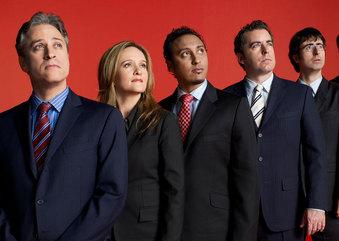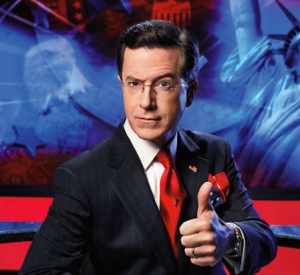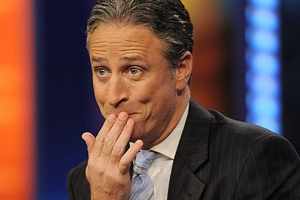Real or Reel? The Complicated Personas of Political Comedians

On August 6, 2015, the media was flooded with nostalgia and heartfelt good-byes as Jon Stewart signed off of The Daily Show for the last time. Some sixteen years earlier, Stewart had taken the reins from Craig Kilburn and steered the show toward a more political front, tackling issues from the left side of the political ring. Since then, The Daily Show has become an institution in U.S. television, skewering American politics with spot-on lampoons. Its correspondents have gone on in the same vein to host their own politically-tinged shows, notably Last Week Tonight with John Oliver and The Colbert Report, a spin-off based on Stephen Colbert’s satiric correspondent character on The Daily Show. It was a bittersweet day for America when Stewart stepped down and made way for a fresh new face, Trevor Noah, and it’s worth considering why Stewart’s departure touched so many people.
Like his successors Trevor, Colbert and Oliver, Stewart was a charismatic frontman for a team of whip-smart, informed writers who work behind the scenes to produce what we ultimately see on the television. This formula is key to a successful comedic yet ultimately political show. These shows—The Daily Show, The Colbert Report, Last Week Tonight—lend a sense of levity in trying times. They use alluring personas to reel in an attentive audience with their charm and sense of humor before lambasting corruption and airing out other important issues that have been largely overlooked. These anchormen are not merely pretty faces; their personas are a key tool in enticing viewers (especially young adults) to turn their attention—and hearts—toward the news.
Entertainment or News?
In 2012, a now widely cited poll from the Pew Research Center showed that The Daily Show and The Colbert Report had the highest percentage of young viewers (18-29 years) among news outlets, with 39 and 43 percent respectively. That’s unsurprising, considering young peoples’ preference for digital media, as well as the hosts’ alignment with liberal viewpoints that are widespread among today’s younger generations. What’s troubling is the fact that these shows are included alongside such legitimate news sources as The New York Times, The Wallstreet Journal and TV programming found on news channels such as CNN. The same poll indicated that 17 percent of young viewers thought The Daily Show was the most accurate news source after CNN, despite the fact that Jon Stewart and company have explicitly claimed not to be sincere journalists. So why do so many young people trust them?

Certainly, these political comedians are entertaining. Just try watching an episode of The Daily Show without at least chuckling to yourself. Even a staunch Republican might chuckle at one of Stewart’s quips about Dick Cheney years after the shooting incident. In a world of bleak stories flooding the news, people look for a little light. Political shows that use humor to draw awareness to issues make people feel more informed without feeling like they’re wasting valuable free time on boring news segments. It’s a form of “slacktivism,” or feel-good support for politics that has little or no practical benefit. However, the fact that every so often something real—or even somewhat real—comes of it reveals the depth of the public’s trust in these comedic news anchors.
Despite the distinct awareness that these opinionated TV personas are made to manipulate us, these political comedians have on occasion invoked real-life action. Colbert in particular blurs the line between pundit and politician. His Super PAC, “Americans for a Better Tomorrow, Tomorrow,” reportedly raised over 1.02 million dollars in 2012, after an ill-fated run for presidency in 2008. But Colbert and his colleagues are not politicians. They may have political agendas, but ultimately their allegiance is to entertainment. They are paid to host a television program, not to make laws. Nor are they true journalists; they aren’t bound by journalistic ethics or any publication’s obligation to present unbiased information. Their intent is to entertain viewers. They do present factual information and evidence to support the points they want to promote, but their segments are not comprehensive.
The Human Element
The argument has been posited that watching the news is easier than reading it, which is especially true when it’s broken down in easily digestible segments like The Daily Show et al. tend to do. This might account for people’s preference of these shows over newspapers, but what about news channels on television? The every-day schedule that The Daily Show (and Colbert before it ended) follow may be a contributing factor in the public’s reliance on these shows for news. For regular viewers, watching the same captivating presenter night after night  can feel like listening to a friend, or at least someone you know. Humans crave the comfort of familiarity, but we might also find such familiarity in watching right-wing pundits like Rush Limbaugh or Glenn Beck every day. Indeed, programs like The O’Reilly Factor can be seen as analogous to The Daily Show. Watching these two opposite-leaning, caricature-esque hosts go head-to-head on either program is always something to behold. However, the reason these conservative shows lack the following of the more liberal counterparts is simple: their hosts lack the charm and, when it comes down to it, the humanity that political comedians like Jon Stewart hold dear.
can feel like listening to a friend, or at least someone you know. Humans crave the comfort of familiarity, but we might also find such familiarity in watching right-wing pundits like Rush Limbaugh or Glenn Beck every day. Indeed, programs like The O’Reilly Factor can be seen as analogous to The Daily Show. Watching these two opposite-leaning, caricature-esque hosts go head-to-head on either program is always something to behold. However, the reason these conservative shows lack the following of the more liberal counterparts is simple: their hosts lack the charm and, when it comes down to it, the humanity that political comedians like Jon Stewart hold dear.
Humor, along with general charisma, is possibly the biggest reason people tend to believe comedic anchors. Having a sense of humor is a mark of human emotion and intelligence. A robot could relay the facts of any news story, but weaving them together with a sense of humor and compassion makes it captivating. It creates a sense of closeness, of trust, that doesn’t exist between citizens and cold facts. And in spite of this well-thought-out persona—the smart, funny, charming political comedian—what’s even more attractive to viewers is when they break out of this formulated routine and reveal sincere emotions. The true appeal of hosts like Stewart shines through in the moments when the anchor breaks character, expressing their own personal distress over the most recent tragedy. In doing so, they make us trust them all the more. Even though the majority of what they present is a calculated script meant to entertain an audience, the honest, unscripted moments are what make us trust these characters even more, as people and as news anchors.
What do you think? Leave a comment.











I have no problem with a comedian getting elected as a president, they are as good a choice as any.
Perhaps they should elected more professional comedians because they know when to joke and when to stop.
Comedians are generally very bright people and as social commentators tend to have a grasp of the issues of the day.
The issue with political comedians is that the story they give you is often a water’d down oversimplified version of what is actually going on. It doesn’t really allow you to reach any conclusions of your own, because the way they present issues makes it seem like there is only one logical path which is rarely the case. It’s like looking at meme’s on facebook and holding those as actual fact…
You really hit the nail of the head by saying the appeal towards these political comedians is that they focus less on the sad aspect of the world. We live in a dark world, and we need comedy to make ourselves feel better. So the fact political comedians can find comedy in politics makes it fun for the audience to watch, but also educational on various topics. Great article.
I prefer these sorts of shows to the news which makes me the target audience of the article. I find the news often depressing or it goes into detail with skewed information. The Political comedian shows also have skewed viewpoints, but at least they openly admit they are biased. To me these series are the news /current affairs in a nutshell, approached in an interesting and light hearted way. That’s how I prefer my news to be presented. I hope this makes sense. I really enjoyed your article.
Stewart and O’Reilly own their biases. The same cannot be said of corporate news reporting with their spurious objectivity.
Some of your criticisms of our era of “infotainment” can also be applied against corporate news: weather girls, aging anchors like Ken Shaw paired with Michelle Dube and the “charming” banter between Lance and the CTV news crew.
Maybe news reporting purists will have to travel back in time to the Cronkite era for a more serious presentation. But does the levity or lack thereof influence the validity of the facts?
Besides you can take heart. Remember the 1997 James Bond flick, “Tomorrow Never Dies” where the villain was a publisher of a news magazine who created chaos to sell papers? At least it hasn’t gotten that bad yet…or has it?
Thank you for the refreshing article. I must say The Daily Show was my source for news. 🙂
It’s political comedians I feel sorry for – you only have to listen to the news to realise that “you can’t make it up”, but they have to.
Just because you tell jokes it doesn’t follow you are not a serious person.
The problem is that the political mainstream is so unified in its opinions on pretty much everything.
At present our whole political scene is full of jokers from our councils to main stream government, trouble is that they are few laughs coming our way as they are more like Joker from the batman movies.
There are few news outlets that separate news from entertainment but the majority of what we see is the same product, just a different brand: some sell comedy, others sell hysteria, etc.
Although The Daily Show and The Colbert Report very obviously have their own biases, as a young adult watching their reports on certain hot topics has inspired me to do more in-depth research about such topics. These television shows may not be the best way to report news, as they’re often more one-sided then other news reports (even though all news reports are biased), but at least they get young people interested and talking about and debating hot topics.
You definitely make some good points about comedic basis and giving news a human element. One of the most striking differences the Daily Show always had with Stewart was a balance between humor and sobriety. He knew when to stop and make a statement. My first interest in news and politics came from the Daily Show. Comedic news may have a bias, but when it adheres to your own bias, it becomes very accessible. Humor is one of the easiest ways to deal with hard situations.
At least comedians know what it is like to earn their own living…
Because of the popularity of Colbert and Stewart, I feel big name news outlets are changing their format to editorializing everything which is a problem because by exercising bias, it detracts from the viewers abilities to decide for themselves. At least with The Daily Show and other programs alike, is that the hosts don’t pretend like they are feeding you objectivity and because they are honest about it, it makes them more lovable and human.
I think, given the development of ‘buzzfeed’ or clickhole journalism, a political comedian’s integrity seems to be on par with that of the news sources that have been traditionally seen as objective.
As a young graduate student, it was Stewart’s “America” book that really opened my eyes with regard to corporate media ownership and the Big Six. He had a way of connecting to young, educated voters (even beyond the ideologically liberal ones) and informing through humor. I think many will miss him. Great article and analysis.
I do think what this article points out about these show is pretty important in the sense that, while entertaining and capable of giving us all respite from the suckiness of whatever goes on in our daily lives, they are, first and foremost, entertainment. They’re great shows, and I’d love to see a hundred more comedians with the raw personality of Stewart or the affability of Oliver or the razor wit of Colbert. But it can be dangerous at times to mix business with pleasure, and at moments where the general audience needs undiluted news, these shows–and any news show on T.V., really–may not be the best sources.
You can check out the Ted Koppel extended interview with Trevor Noah where he actually states that Trevor and his cohorts are doing a better job of reporting the news than some of his colleagues. That is quite an endorsement!
Munjeera
I think one of the major reasons that so many people find these comedy news shows so enjoyable and ultimately reliable is because the unlike a regular composed news anchors one would see on network news, Colbert and Stewart (or at least their personas) would be indignant, upset and emotional about the events of the news where a network anchor would present the news flatly.
Images, sounds, and video engage an audience’s emotions more more effectively than plain text (this is why newspapers decline as tv stands strong), but when these comedian newsmen directly show emotions the news consumer will like have their emotions affected and because of this give more importance to the news that they made an emotional connection with.
I agree with what you had to say about the allure of political comedians is that the audience can see their emotions. I think that’s important, because it’s a contrast to the disconnected nightly news. I think that people are starting to find an interest in news that offer a more personal approach, where those delivering it analyze what is happening further than just stating facts.
There was a time I felt that voices like Stewart, Colbert, Oliver, Maher, Wilmore and so on were invaluable. Now I’m not so sure.
I’m wondering if these individuals really educate and motivate or simply let us vent, allowing us to move on to other things. Should the tensions of our world be relived like a gas valve, or should they be channeled into organized movements? Shouldn’t the satiric knife be used, somehow, to surgically strike the sickness so obviously rife in the body politic? Thomas Nast anyone?
Media, to a very large extent, is on its heels; it operates within the constraints that corporate power allows it to. Revenue realties and ownership demands have undermined the mainstream sector of the 4th estate, and news, as a general matter, doesn’t freely and rigorously pursue the truth wherever it may lead. If it did, would we need the Assange’s, Ellsburg’s and Snowden’s of the world? Would we need alternative press?
Colbert’s in-your-face (literally) takedown of George W. Bush at the 2006 Correspondent’s Dinner was the high water mark of any of the so-called political comedians. Speaking truth to power directly, Colbert delivered a message that many felt was not being heard. So it was cathartic, but did it actually have any effect on policy? Do any of these shows? Or are they mainly telling us what we already know about corruption and the misplaced priorities of our leaders?
I wonder if these shows are unintentionally medicating us with laughter when we should be mobilized with righteous indignation. The focus is on mocking the ever-changing faces, not the system that produces them. Treat the cause, not the symptom.
I actually just spent a whole semester learning about this. The intersection of politics and entertainment isn’t new, but it’s still worth studying. Soft news programs like The Daily Show and Last Week Tonight with John Oliver lower the already high entry costs of politics, making it more accessible and understandable to people with little pre-existing knowledge on politics.
At one point in time when our TV news came from the big 3 (ABC, NBC, & CBS) Walter Cronkite was “The Most Trusted Man in America”. Now that we have so many more options people are gravitating towards what appeals to them most and what better way for a young person to learn about political issues than through comedy. Jon Stewart hosted The Daily Show for 16 years, his genuine emotions and sincerity are what made him our “political dad” as Trevor Noah put it when he took over the show. Because political comedy is entertaining it is an effective way to consume political news that often is not. I read an article by the National Communication Association that said “One overarching finding is that political comedy appears to promote more cynicism toward politicians, the government, and the media, but also tends to empower citizens to think they can contribute to and make a difference in politics.” It seems to encourage critical thinking and political engagement which sounds pretty promising to me.
This is a great observation of how such shows are becoming an interesting source of news for the young generation. There are two points in particular that I believe could be explored further, which I did not see addressed in this article.
One – Do we lack serious news sources that people consider neutral or a venue for representing the so called left view point on daily political issues?
Two – I believe the guests of the shows also add merit to the shows’ popularity. It is not often that the young generation would tune in to political debates or politicians speaking in general. The guests on shows such as the Daily Show, provide an entertaining manner (as you pointed out about the show itself) to introduce us to personalities and their ideological thinking without the seriousness of a heated debate. Despite the humorous comments, in general we still get a sense of where that particular guest, political or not, stands on the issues we care about.
This is a great observation of how such shows are becoming an interesting source of news for the young generation. There are two points in particular that I believe could be explored further, which I did not see addressed in this article.
One – Do we lack serious news sources that people consider neutral or a venue for representing the so called left view point on daily political issues?
Two – I believe the guests of the shows also add merit to the shows’ popularity. It is not often that the young generation would tune in to political debates or politicians speaking in general. The guests on shows such as the Daily Show, provide an entertaining manner (as you pointed out about the show itself) to introduce us to personalities and their ideological thinking without the seriousness of a heated debate. Despite the humorous comments, in general we still get a sense of where that particular guest, political or not, stands on the issues we care about.
This article shined a light on an important, yet rarely talked about, topic. While these journalists make excellent and funny points about politics today, people let themselves believe that reporters such as Colbert are legitimate politicians rather journalists. These shows are important for viewers in order to feel the sense of knowledge, however the viewers need to understand these shows are for entertainment, not news.
I agree with many of the comments that telling jokes doesn’t lead to a logical conclusion that they are any less serious about the facts. I disagree that shows like these steer away from “sad” stories; often this is where these stories get a well-deserving amount of coverage. I also have trouble with the assumption that “real” news sources are unbiased. They are incredibly biased towards stories featuring violence, crime, and suffering, because these are the stories that drive up viewership. The fact that The Daily Show and others have found a way to present these stories with a degree of humor is admirable.
I think a large part of the appeal programs like The Daily Show have is that they don’t follow journalistic guidelines so strictly, which allows them to be more personable. They give their opinions on issues, and critique (comedically of course) things that they don’t agree with. It’s always easier to trust someone being genuine than a news anchor who seems like they’re hiding something, even if it’s simply them trying to be objective.
Absolutely! There’s an honesty and a “lack of bullshit” that you don’t see from the mainstream media. In a sense, the Stewarts and Colbert’s are unshackled. The anchors on the news have a phoniness. Well said!
An enjoyable read, but not without some problems. I can see how you would raise an eyebrow at the idea of Colbert, a straw man near-cartoon character listed as a news source. But comparing him, Oliver and Stewart to the likes of Beck and Limbaugh goes, I feel, two steps too far.
I would say the biggest difference between Stewart / Colbert and Limbaugh / Beck is that Colbert and Stewart (Stewart more so) cite their sources, which are usually primary sources. They reference, and quote from, reports, studies and the politicians themselves.
They show clips and quotes in their context – they even extend clips other networks had cut misleadingly, showing their previously hidden, real contexts.
“Last Week Tonight” in particular, takes the approach of news-with-comedy as opposed to comedy-with news. I don’t see these shows being included as information sources alongside network news as “troubling,” as you put it. I see an appropriate level of trust in people who often do more to research the topics they cover than the “real” news channels they lampoon – and indeed, in Oliver’s case, rival.
A good essay. Seeing these shows as almost a reaction to cable news shows is, I think, what makes them useful. When the “Daily Show” addresses something on Fox News, for example, and shows the manipulation involved, then the Daily Shows goes beyond entertainment to play an important role in media news consumption.